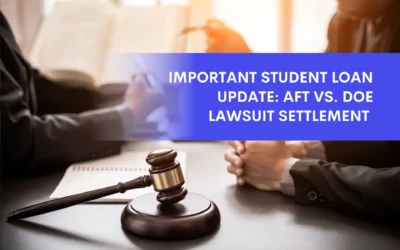Key Takeaways
- A student loan refinance calculator helps estimate savings and better terms.
- Enter loan balance, interest rate, and term to explore refinancing scenarios.
- Benefits of refinancing include lower interest, reduced payments, and loan consolidation.
- Regularly reassess loans to optimize repayment and seize refinancing opportunities.
Refinancing student loans is one of the most accessible options for students seeking debt relief. You sign up with a private lender for a new loan with more favorable terms, and that new loan is used to cover your existing loans.
However, to truly understand the potential benefits, a student loan refinance calculator becomes essential. It lets you compare repayment scenarios, highlighting potential savings and helping you make an informed decision about whether refinancing is best for your situation.
To gain a more realistic perspective on available rates and receive personalized advice, connect with one of our expert advisors. They can help you explore a range of options, saving you the time and hassle of shopping around on your own.
How Our Calculator Works
As a means to provide the best support for students looking to refinance, this calculator offers an easy way to explore various refinancing options based on calculations.
To get started, you’d need to input a few key details to generate accurate results. The primary details required here include:
- Current Loan Balance: This is the total remaining amount of your existing student loans. Entering this accurately is vital because it determines the total amount you would potentially be refinancing. Any mistakes here can negatively affect the entire calculation.
- Current Interest Rate: Input the average interest rate across your loans. This helps the calculator estimate how much you’re currently paying in interest, setting a baseline for potential savings.
- Monthly Payment: The amount you currently pay each month toward your loans. Knowing this number gives you insight into how refinancing could alter your cash flow.
- Remaining Loan Term: The number of months or years left to pay off the current loans. This allows the calculator to assess how refinancing could affect your repayment period.
- Desired Loan Term: Indicate how long you’d prefer to take to pay off the new refinanced loan. This choice could impact both monthly payments and the total cost of the loan.
Using The Student Loan Refinancing Calculator
Once you’ve entered the required information, the calculator quickly provides an estimate of how refinancing could impact your loan payments and total interest costs.
Here’s how to interpret the results:
Start the Calculation
With all fields filled out—loan balance, interest rate, monthly payments, and desired terms—click the calculate button.
The calculator will process these inputs and generate a potential refinancing plan based on this.
Review Your New Monthly Payments
One of the key outputs is the projected new monthly payments based on the terms you’ve selected. This figure will give you an idea of how refinancing could affect your budget month-to-month, whether it reduces your payments or possibly raises them to shorten your loan term.
Examine Total Interest Savings
Next, the calculator displays your projected interest savings. By comparing this with your current total interest cost, you can see whether student loan refinancing provides a financial advantage for your situation.
Adjust and Recalculate as Needed
If your initial results don’t align with your goals, you can adjust the loan term, interest rate, or other parameters until you find a more favorable option.
Why Calculating Your Student Loans Is a Healthy Practice
Regularly calculating your student loans might seem like a wasted effort, but the three reasons below prove it’s indeed a healthy practice.
Debt Awareness
Calculating your student loans regularly keeps you actively aware of your debt and helps you manage it strategically.
Several students and recent graduates focus solely on monthly payments without fully understanding how loan terms, rates, and additional payments affect their debt.
Regular calculations solve this issue. You get a clearer picture and understand better how to reduce overall debt.
Mindful Budgeting
Given that some student loans can last up to 20 years, it’s easy to lose track of your monthly payments unless you routinely review them.
The advantage of regularly calculating your payments is that it not only keeps you aware of the monthly interest but also helps you prioritize and balance your expenses. This way, you might decide to increase monthly payments or even consider refinancing options.
Financial Awareness
As your financial situation improves over time, regularly calculating your student loan repayments ensures you don’t miss opportunities to reduce your debt.
You might receive a raise or have chances to make extra payments. Knowing the impact of these factors on your loans helps you make better plans.
How Refinancing Works
Generally, with refinancing, you take out a new loan with a private lender to pay off one or more existing student loans. The goal is to secure better terms—lower interests, different repayment periods, or both—that’ll save you money over time.
The process begins by comparing offers from several lenders. Each one will consider your credit score and overall financial profile. This would help them determine the interest rate and loan terms they’re willing to offer.
Students with credit scores above 680 are often eligible to get lower interest rates. However, if your credit is poor or average, you might have to provide a cosigner with healthy credit.
Once you’ve finalized your arrangement with a lender, they will pay off your existing loans, leaving you with just one loan to manage. From that point, you make monthly payments on the refinanced loan under the new terms.
Note that refinancing federal student loans into private loans forfeits federal benefits like income-driven repayment plans or deferment options.
Why Consider Refinancing Student Loans
Refinancing student loans can come with several benefits.
Lower Interest Rates
Refinancing can help you lower your loan rates, especially if your credit score or finances have improved since you first took out your loans.
While the difference in rates might not be as significant as you’d expect, the slightest change in interest rates can reduce your total student loan debt over time.
Reduced Monthly Payments
Monthly payments are usually influenced by the length of your loan term. If you’ve earlier taken out a short-term loan and are now struggling to manage payments for the month, refinancing can help by increasing your loan term.
In another light, your monthly payments can also be reduced with reduced interest rates, which is also possible when you refinance student loans.
Multiple Loan Consolidation
Loan consolidation refers to a process of combining several loans into a single one. Having different loans scattered around makes it difficult to manage—you can easily forget your payments, putting you in a tight spot.
Thankfully, refinancing offers a means to combine all of these loans, making it easy to track your debt and avoid missing payments.
Flexible Repayment Terms
Several private lenders offer flexible repayment options, allowing you to choose a shorter term to pay off your debt faster or a longer term for reduced monthly payments.
This flexibility can be customized to align with your financial priorities, whether that’s saving on interest or managing cash flow.
Release of Cosigner
Refinancing can be an opportunity to release your cosigner if you originally needed them to secure your loans. Some lenders allow borrowers with a strong credit history to refinance independently, relieving any family or friends who previously helped you by co-signing.
Student Loan Refinance FAQs
Can I refinance both federal and private student loans?
Yes, you can refinance both federal and private student loans through a private lender.
When you refinance, your existing loans are consolidated into a new private loan with new terms. However, refinancing federal loans with a private lender means forfeiting federal protections, so consider this carefully.
What credit score do I need to refinance my student loans?
Most lenders look for a credit score of at least 650 to 680, though higher scores often qualify for better rates. Some lenders offer refinancing to borrowers with lower scores but may charge higher interest rates.
How much can I save by refinancing?
The amount you save depends on factors like your current interest rate, the new rate you qualify for, and the length of the repayment term you choose.
Is refinancing the same as consolidation?
No, refinancing and consolidation are different. Federal loan consolidation, which is done through the federal government, combines multiple federal loans into one but doesn’t typically lower your interest rate.
Refinancing, on the other hand, combines loans into a new private loan and has the potential to lower your rate, depending on your financial profile.
Will refinancing hurt my credit score?
Refinancing may cause a temporary dip in your credit score due to the hard credit inquiry from the lender.
However, if you consistently make on-time payments on your new loan, your credit score is likely to recover and may even improve in the long run due to your positive payment history.
Brandon Barfield is the President and Co-Founder of Student Loan Professor, and is nationally known as student loan expert for graduate health professions. Since 2011, Brandon has given hundreds of loan repayment presentations for schools, hospitals, and medical conferences across the country. With his diverse background in financial aid, financial planning and student loan advisory, Brandon has a broad understanding of the intricacies surrounding student loans, loan repayment strategies, and how they should be considered when graduates make other financial decisions.




